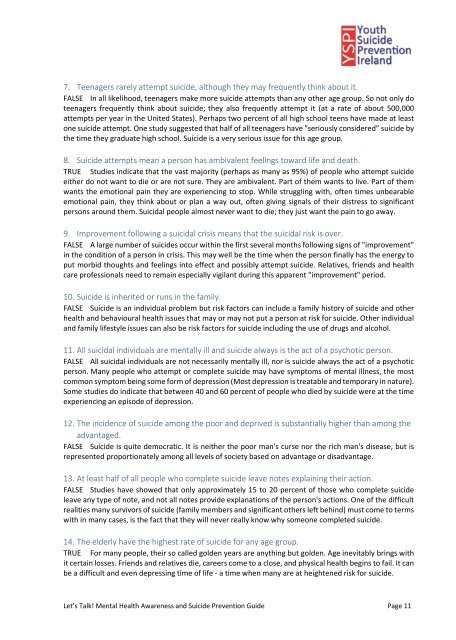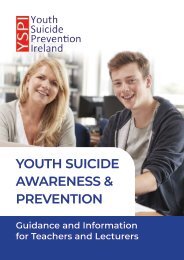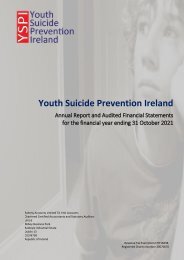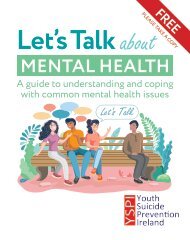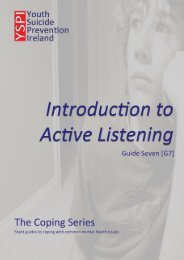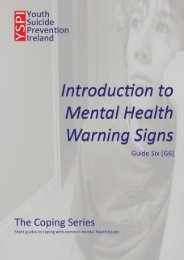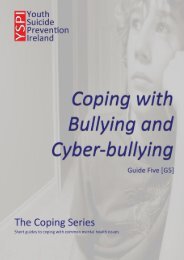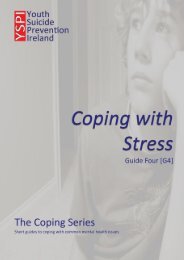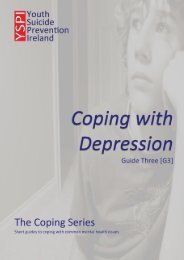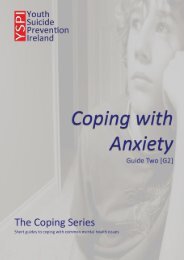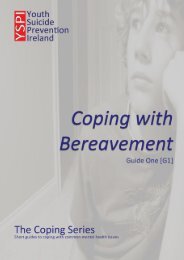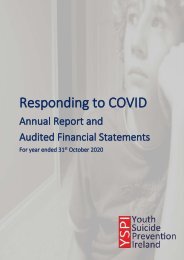Let's Talk Guide 2021
A new guide to mental health awareness and suicide prevention.
A new guide to mental health awareness and suicide prevention.
- No tags were found...
Create successful ePaper yourself
Turn your PDF publications into a flip-book with our unique Google optimized e-Paper software.
7. Teenagers rarely attempt suicide, although they may frequently think about it.<br />
FALSE In all likelihood, teenagers make more suicide attempts than any other age group. So not only do<br />
teenagers frequently think about suicide; they also frequently attempt it (at a rate of about 500,000<br />
attempts per year in the United States). Perhaps two percent of all high school teens have made at least<br />
one suicide attempt. One study suggested that half of all teenagers have "seriously considered” suicide by<br />
the time they graduate high school. Suicide is a very serious issue for this age group.<br />
8. Suicide attempts mean a person has ambivalent feelings toward life and death.<br />
TRUE Studies indicate that the vast majority (perhaps as many as 95%) of people who attempt suicide<br />
either do not want to die or are not sure. They are ambivalent. Part of them wants to live. Part of them<br />
wants the emotional pain they are experiencing to stop. While struggling with, often times unbearable<br />
emotional pain, they think about or plan a way out, often giving signals of their distress to significant<br />
persons around them. Suicidal people almost never want to die; they just want the pain to go away.<br />
9. Improvement following a suicidal crisis means that the suicidal risk is over.<br />
FALSE A large number of suicides occur within the first several months following signs of "improvement"<br />
in the condition of a person in crisis. This may well be the time when the person finally has the energy to<br />
put morbid thoughts and feelings into effect and possibly attempt suicide. Relatives, friends and health<br />
care professionals need to remain especially vigilant during this apparent "improvement" period.<br />
10. Suicide is inherited or runs in the family.<br />
FALSE Suicide is an individual problem but risk factors can include a family history of suicide and other<br />
health and behavioural health issues that may or may not put a person at risk for suicide. Other individual<br />
and family lifestyle issues can also be risk factors for suicide including the use of drugs and alcohol.<br />
11. All suicidal individuals are mentally ill and suicide always is the act of a psychotic person.<br />
FALSE All suicidal individuals are not necessarily mentally ill, nor is suicide always the act of a psychotic<br />
person. Many people who attempt or complete suicide may have symptoms of mental illness, the most<br />
common symptom being some form of depression (Most depression is treatable and temporary in nature).<br />
Some studies do indicate that between 40 and 60 percent of people who died by suicide were at the time<br />
experiencing an episode of depression.<br />
12. The incidence of suicide among the poor and deprived is substantially higher than among the<br />
advantaged.<br />
FALSE Suicide is quite democratic. It is neither the poor man's curse nor the rich man's disease, but is<br />
represented proportionately among all levels of society based on advantage or disadvantage.<br />
13. At least half of all people who complete suicide leave notes explaining their action.<br />
FALSE Studies have showed that only approximately 15 to 20 percent of those who complete suicide<br />
leave any type of note, and not all notes provide explanations of the person's actions. One of the difficult<br />
realities many survivors of suicide (family members and significant others left behind) must come to terms<br />
with in many cases, is the fact that they will never really know why someone completed suicide.<br />
14. The elderly have the highest rate of suicide for any age group.<br />
TRUE For many people, their so called golden years are anything but golden. Age inevitably brings with<br />
it certain losses. Friends and relatives die, careers come to a close, and physical health begins to fail. It can<br />
be a difficult and even depressing time of life - a time when many are at heightened risk for suicide.<br />
Let’s <strong>Talk</strong>! Mental Health Awareness and Suicide Prevention <strong>Guide</strong> Page 11


